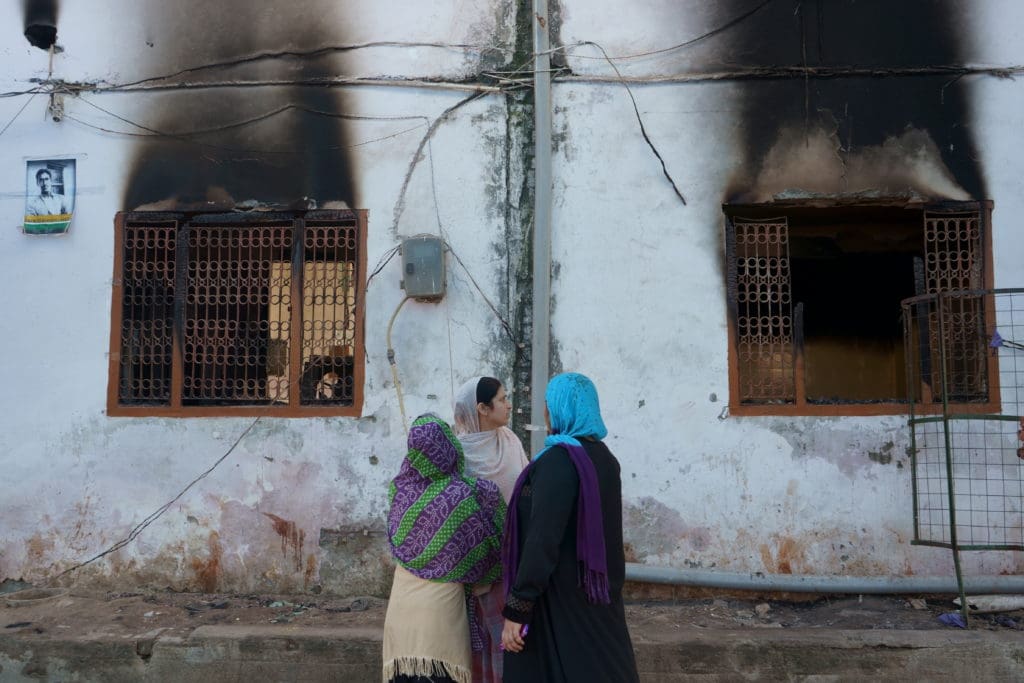Delhi: On 16 July 2019, the Akhil Bharatiya Vidya Parishad (ABVP) and the National Democratic Teachers Front (NDTF), respectively, student and teacher groups linked to the Rashtriya Swayamsevak Sangh (RSS), led protests against “anti-RSS content” in undergraduate syllabus outside the University’s vice-chancellor’s office, while an academic council meeting was underway.
Their objections were to a lesson on the 2002 Gujarat communal violence , portraying the RSS as attackers; the introduction of papers on caste, sexuality and queerness; and material on the 2013 Muzzafarnagar riots and anti-Muslim lynchings. Three days later, on 19 July 2019, sections on the Gujarat and Muzaffarnagar communal violence were removed by the English department.
While the involvement of Hindu groups in the violence in Gujarat (here and here) and Muzaffarnagar (here and here) is evident, the ABVP and NDTF protests alleged the material showed the Bajrang Dal and RSS in a “bad light”.
More syllabi changes have followed since, including the removal of papers on Bhimrao Ramji Ambedkar, Mohandas Karamchand Gandhi, Muhammad Iqbal, and the Constitution of India from the political science syllabus. Dalit writers Bama and Sukirtharana were dropped from the English syllabus.
The subject-specific changes are being implemented on the back of new larger policies on curriculum and teaching. Two significant examples are the National Education Policy (NEP), and the new four-year undergraduate programme (FYUP), implemented in Delhi University in 2022.
Maya John, PhD, professor of history at Jesus and Mary College, and a member of DU’s Academic Council, described, at a panel discussion on curricula revisions in July 2023, the changes as a “cultural war” entering higher education. Teachers have criticised syllabi changes as being ambiguous, arbitrary and lacking in consultation.
These are a microcosm of shifts in education syllabi taking place from school to college nationwide. The first attempts to rewrite school history textbooks surfaced in the early 2000s, culminating in recent controversies around the removal of Mughal history and other changes in the National Council of Educational Research And Training (NCERT) syllabi, revealing the infusion of right-wing Hindutva ideology into public education.
In June 2023, several of the original drafters of the NCERT syllabi, such as Yogendra Yadav and Suhas Palshikar, publicly demanded that their names be removed from the textbooks due to their disagreements with the revisions.
A Mysterious ‘Oversight Committee’
Any changes to syllabi made in DU are usually decided by the faculty of the subject, then subject to the university’s academic council, the body that regulates all standards of “instruction, education and examination within the university” as per The Delhi University Act, 1922.
A new stakeholder called the “oversight committee” was introduced in 2019. Between 2019 and 2021, this committee pushed through several changes in syllabi. Several professors have been vocal against it, regarding it as not only a “censor body”, but also “illegal”.
Naveen Gaur, PhD, an associate professor of physics at DU’s Dyal Singh College and a former member of the academic council from 2019 to 2023, said there the university’s rules did not permit such a committee. According to Gaur, it was “arbitrarily” created by Yogesh Singh, DU’s vice chancellor (VC), to effect changes across department syllabi.
“The committee is functioning, but not according to Delhi University rules,” said Gaur. “The committee tries to control certain departments whose syllabi design is unpalatable to the ruling dispensation. It’s illegal, and we have frequently raised our voices against it.”
Mithuraaj Dhusiya, PhD, an associate professor of english at Hansraj College and an elected member of the academic council from 2023 to 2025, called the committee “unconstitutional and illegal”.
With regard to the English department, Dhusiya said the committee “has been purposefully going against particular texts and particular authors for no rhyme or reason solely on the basis of ideological dispensation”. He said along with English, history and political science syllabi were often “on the committee’s radar”, and changes were averted only after criticism in the media and in council meetings.
Minutes and agendas of academic council meetings are available online, as well as papers of other committees. However, Article 14 could not find any information on the oversight committee online, including on who the members are. The link to the oversight committee on the DU website leads to a “404 error”.
Even without a clear mandate, the oversight committee has proposed and enforced syllabi revisions. In 2021, it removed two Dalit writers Bama and Sukirtharana, and Mahasweta Devi’s short story ‘Draupadi’ from the fifth semester English (Honors) syllabus. 1100 academics and writers condemned the removal and urged these women writers be brought back.
Article 14 sought comment from Yogesh Singh, via email, on his role in syllabi changes and the oversight committee. This article will be updated if a response is received.
This story was originally published in article-14.com. Read the full story here





